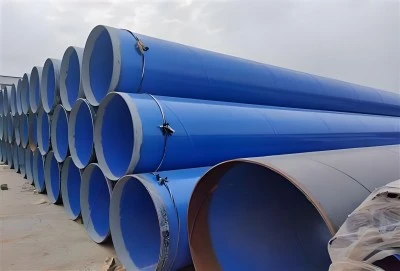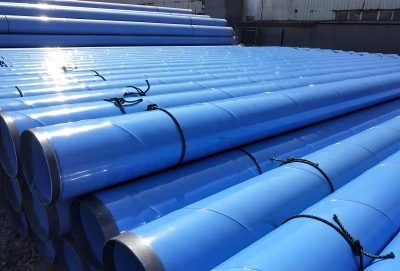In the realm of gas transportation and distribution, safety is paramount. As industries and communities rely heavily on efficient gas delivery systems, the need for robust and secure piping solutions has never been more critical. Enter epoxy coated steel gas pipes – a groundbreaking innovation that has revolutionized the safety standards of gas infrastructure. This article delves into the crucial role these pipes play in ensuring the safety and longevity of gas transportation systems.
|
|
|
The Role of Epoxy Coating in Preventing Corrosion
Corrosion is the arch-nemesis of steel pipes, particularly in gas transportation systems where exposure to various environmental factors can accelerate deterioration. Epoxy coating serves as a formidable barrier against this pervasive threat, offering unparalleled protection to steel gas pipes.
The epoxy coating acts as an impermeable shield, preventing direct contact between the steel surface and corrosive elements such as moisture, chemicals, and soil contaminants. This protective layer significantly reduces the risk of rust formation and material degradation, which are common issues in uncoated pipes.
Moreover, the epoxy coating's ability to withstand high temperatures and resist chemical attacks makes it ideal for gas pipelines that operate under extreme conditions. The coating maintains its integrity even when exposed to harsh environments, ensuring continuous protection throughout the pipe's lifecycle.
Another crucial aspect of epoxy coating is its ability to mitigate internal corrosion. Gas pipelines often transport substances that can be corrosive to bare steel. The smooth, non-porous surface created by the epoxy coating minimizes the adherence of corrosive materials, thereby reducing the risk of internal deterioration.
The effectiveness of epoxy coating in corrosion prevention translates directly to enhanced safety. By maintaining the structural integrity of the pipes, the coating significantly reduces the likelihood of leaks, ruptures, or catastrophic failures that could pose serious safety hazards.
How Epoxy Coated Steel Improves Gas Pipe Longevity
The longevity of gas pipelines is a critical factor in ensuring consistent and safe gas distribution. Epoxy coated steel gas pipes have emerged as a superior solution for extending the operational life of gas transportation systems.
One of the primary ways epoxy coating enhances pipe longevity is through its exceptional resistance to abrasion and impact. The tough, durable coating protects the steel surface from mechanical damage during installation, operation, and maintenance. This resistance to wear and tear ensures that the pipes maintain their structural integrity over extended periods, even in challenging environments.
Furthermore, the epoxy coating's ability to flex and adhere tightly to the steel surface allows it to accommodate the natural expansion and contraction of pipes due to temperature fluctuations. This flexibility prevents cracking or peeling of the coating, ensuring continuous protection against corrosion and other forms of degradation.
The smooth surface provided by epoxy coating also contributes to improved flow efficiency within the pipes. By reducing friction and turbulence, the coating minimizes wear on the pipe's interior, further extending its operational life. This enhanced flow efficiency can also lead to energy savings in gas transportation systems.
Another significant advantage of epoxy coated pipes is their reduced maintenance requirements. The protective coating minimizes the need for frequent inspections, repairs, and replacements, resulting in lower lifecycle costs and improved system reliability. This reduction in maintenance interventions also translates to fewer disruptions in gas supply, enhancing overall system safety and efficiency.
By substantially extending the service life of gas pipelines, epoxy coated steel pipes contribute to the long-term sustainability and safety of gas infrastructure. The increased longevity not only ensures a more reliable gas supply but also reduces the environmental impact associated with frequent pipe replacements.
Key Factors to Consider When Choosing Epoxy Coated Pipes
Selecting the right epoxy coated steel gas pipes is crucial for maximizing safety and performance in gas transportation systems. Several key factors should be taken into account when making this important decision:
Coating Quality: The effectiveness of epoxy coated pipes heavily depends on the quality of the coating application. Look for pipes that have undergone rigorous quality control processes to ensure uniform coating thickness and adherence. Advanced application techniques, such as electrostatic spray coating, can provide superior coating quality and consistency.
Pipe Material: While the epoxy coating provides excellent protection, the underlying steel quality remains crucial. Choose pipes made from high-grade steel that meets or exceeds industry standards for strength, ductility, and chemical composition. The combination of superior steel and high-quality epoxy coating ensures optimal performance and longevity.
Coating Thickness: The thickness of the epoxy coating plays a vital role in its protective capabilities. Thicker coatings generally offer better resistance to corrosion and mechanical damage. However, the optimal thickness may vary depending on the specific application and environmental conditions. Consult with experts to determine the most suitable coating thickness for your project.
Chemical Resistance: Different gas compositions and environmental factors may require specific chemical resistance properties. Ensure that the chosen epoxy coating is compatible with the type of gas being transported and can withstand any potential chemical exposure along the pipeline route.
Temperature Range: Gas pipelines often operate across varying temperature conditions. Select an epoxy coating that can maintain its protective properties across the expected temperature range of your application. Some advanced epoxy formulations offer excellent performance in both extremely low and high-temperature environments.
Certification and Standards: Opt for epoxy coated pipes that meet relevant industry standards and certifications. This ensures that the pipes have undergone rigorous testing and comply with safety and performance requirements. Look for certifications from recognized bodies such as API, ASTM, or ISO.
Manufacturer Reputation: The reputation and track record of the pipe manufacturer are crucial considerations. Choose a reputable supplier with a proven history of producing high-quality epoxy coated steel pipes. Research customer reviews, case studies, and industry references to gauge the manufacturer's reliability and product performance.
Installation Requirements: Consider the specific installation requirements of epoxy coated pipes. Some coatings may require special handling or joining techniques to maintain their integrity during installation. Ensure that your installation team is trained and equipped to work with epoxy coated pipes to prevent damage to the protective layer.
Long-term Support: Look for manufacturers that offer comprehensive support throughout the lifecycle of the pipes. This may include technical assistance, maintenance guidance, and warranty coverage. A strong support system can be invaluable in ensuring the long-term performance and safety of your gas pipeline system.
Cost-effectiveness: While the initial cost of epoxy coated pipes may be higher than uncoated alternatives, consider the long-term cost-effectiveness. Factor in the reduced maintenance requirements, extended service life, and improved safety when evaluating the overall value proposition of epoxy coated steel gas pipes.
By carefully considering these factors, you can make an informed decision when selecting epoxy coated steel gas pipes for your project. The right choice will not only enhance safety but also contribute to the efficiency and longevity of your gas transportation infrastructure.
In conclusion, epoxy coated steel gas pipes have emerged as an indispensable solution for ensuring the safety and longevity of gas transportation systems. Their superior corrosion resistance, extended service life, and overall durability make them an essential component in modern gas infrastructure.
As the demand for safe and efficient gas delivery continues to grow, the importance of adopting advanced piping solutions cannot be overstated. Epoxy coated steel pipes offer a reliable, cost-effective, and environmentally friendly option that meets the stringent safety requirements of the gas industry.
By investing in high-quality epoxy coated steel gas pipes, stakeholders in the gas sector can significantly enhance the safety, reliability, and sustainability of their operations. This not only protects valuable assets but also contributes to the overall well-being of communities that depend on safe and uninterrupted gas supply.
As we look to the future of gas infrastructure, it's clear that epoxy coated steel pipes will continue to play a pivotal role in shaping safer, more efficient, and more resilient gas transportation systems worldwide.
For more information on our range of high-quality epoxy coated steel gas pipes and how they can benefit your project, please don't hesitate to contact us at info@longma-group.com. Our team of experts is ready to assist you in finding the perfect piping solution for your specific needs.














